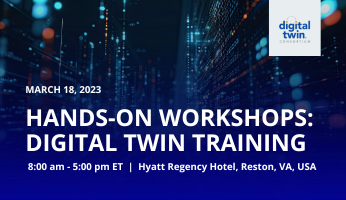Save your seat for our member meeting in Reston!
Join us for the first fully integrated DTC member meeting welcoming former IIC members. March 19 – 21 will be packed with three days of thought leadership and networking with the leaders in digital twin innovation and IoT technology – our members!
Our agenda is packed with Keynotes, Working Group Sessions, Case Studies, Panels and Member Presentations. Day 3 of our member meeting is organized as an exploration of The Impact of a New Era in Digital Transformation Across Industries with interactive demos and panels that will be open for the public to attend.
Optional Digital Twin Training Workshops are available on Monday, March 18th before the meeting begins with a choice of four different workshops available.
We can't wait to see you there!
Keynote Presenters
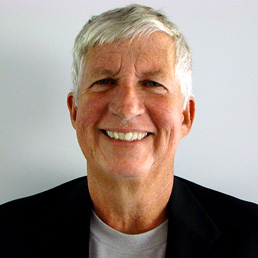
Dr. Michael Grieves
Executive Director
Digital Twin Institute
Read Bio
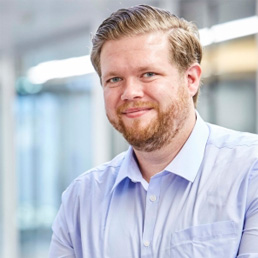
Dennis Dokter
Smart Cities Lead
Nexus
Read Bio
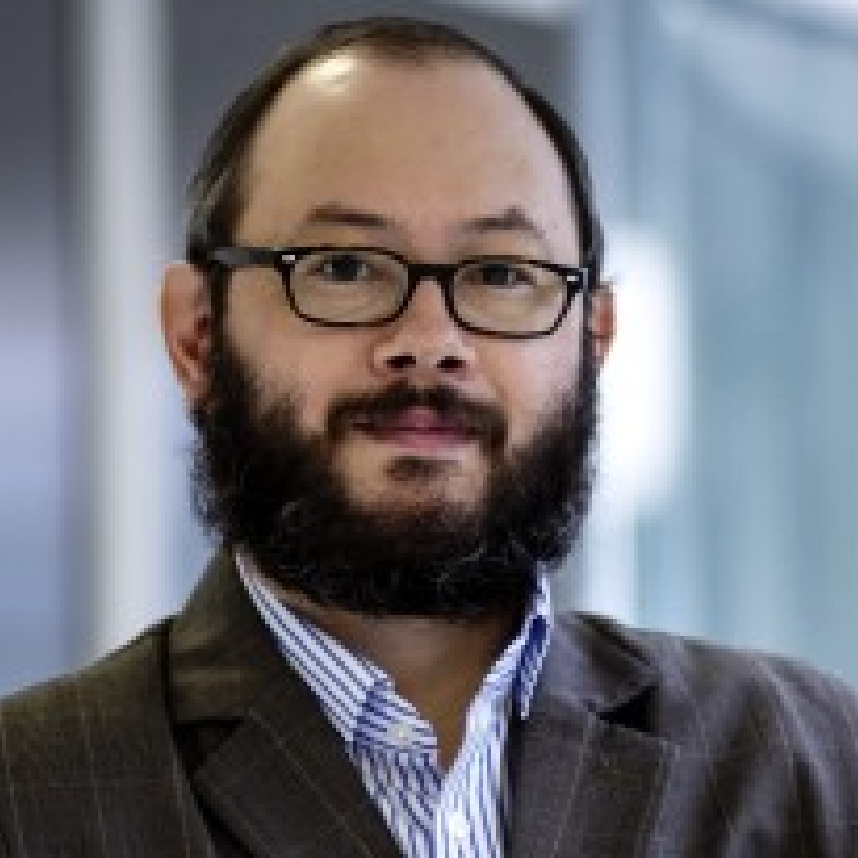
Dr. Carlos Toro
Head of Data and Analytics (Chile), Digital Twin Coordinator LATAM (Global Innovation Center)
NTT Data
Read Bio
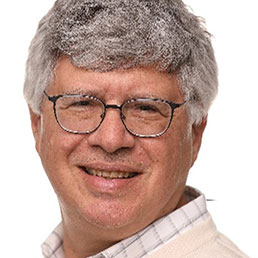
Dr. David Tennenhouse
Senior Advisor
National Science Foundation
Read Bio

Dr. Adam T. Drobot
President and Chair
Open Tech Works
Read Bio
Agenda
March 19th
| time | Session |
|---|---|
| 8:00am-8:30am | Breakfast |
| 8:30am-9:00am | Welcome, Opening and Update on Transform! @InfoComm |
| 9:00am-10:00am | Keynote: Driving AI Enabled Digital Transformation to Create Value in the Industrial Metaverse
Digital transformation, especially involving the fundamental building block of Digital Twins, is a primary driver of efficiency and effectiveness in today’s organization. Digital transformation is about moving industrial work from the physical world into the virtual world or, as it is being called, the Industrial Metaverse. The value is derived because, over time, digital bits become cheaper while physical atoms become much more expensive. Artificial Intelligence (AI) whose native environment is the Industrial Metaverse has the potential to help magnify the value by its assistance. Dr. Grieves will describe his view of how this is unfolding, the opportunities that can be captured, and the threats that need to be avoided. Speaker: Dr. Michael Grieves, Executive Director, Digital Twin Institute |
| 10:00am-10:15am | Break |
| 10:15am-11:15am | Keynote: Nexus Smart Cities: Understanding Data - How Digital Twins will allow for data-driven insights into the innovation pathway
This presentation at the Digital Twin Conference will highlight Nexus, the University of Leeds' innovation hub, dedicated to fostering and catalyzing collaborations between industry and academics for impactful research and innovation. Specifically, the focus within Nexus on smart cities (by using the DISCS approach) explores data-driven solutions to enhance urban environments. The innovation pathway, specifically proof-of-concept development, is in need of effective partitioning to increase inclusivity, mitigate risks and reduce costs. The integration of a testbed and living lab ensures user engagement, enhancing the propensity for adoption and bringing the strengths of the University in STEM and Social Sciences closer together. The addition of a digital twin layer to smart cities solutions design and integration offers full data visualization, introducing elasticity to de-risk the innovation pathway. Speakers: Dennis Dokter, Smart Cities Lead, Nexus |
| 11:15am-11:30am | Cross-Consortia Update
Speakers: Dan Isaacs, CTO, DTC - Chuck Byers, CTO, IIC |
| 11:30am-12:00pm | Ecosystem Update: New Members and Partnerships |
| 12:00pm-1:00pm | Lunch |
| 1:00pm-2:15pm | Working Group & Subgroup Reports
Hear from Working Group and Subgroups Chairs and Leads on the work going on within their groups and how to get involved. |
| 2:15pm-2:30pm | Break |
| 2:30pm-4:30pm | Integrated Working Group and Subgroup Roundtables
Participate in Working Group and Subgroup focused meetings to discuss and work directly on charters, focus areas and deliverables. |
| 4:30pm-5:30pm | Consortium Strategy Brainstorming |
March 20th
| time | Session |
|---|---|
| 8:30am-9:00am | Welcome, Day 1 Summary and Day 2 Events |
| 9:00am-10:00am | Keynote: Using Composable Digital Twins for Deploying Intelligent Automation - The Case of the Micro Factory
NTT Data serves clients in various industries, including finance, healthcare, public sector, telecommunications, and manufacturing. Digital Twin activities are carried out within the global Innovation Center that NTT DATA has launched in 2022, with focus on leading-edge technologies and aiming at establishing world-leading research and development teams and generating new business through joint innovation projects with customers. As it is very complex to serve different domains, NTT Data had to develop a strategy that will allow reusability of developments at technical level. Considering the aforesaid need, Digital Twin Consortium’s own Capabilities Periodic Table (CPT) becomes a very relevant pivot where micro services and micro front ends may be defined and executed to wrap existing solutions and define new technical requirements alike. In this keynote, we will share the outcomes of a novel approach that NTT Data has been actively working. Such approach deals with the fast execution of Digital Twin projects based on the concepts of composability and modularity. On the other hand, the not always possible action of showcasing existing solutions to end customers, brings an additional difficulty and for that we have created a capabilities demonstrator that can be utilized to train ML models, bring the physical aspect of a Digital Twin into our customers offices and ultimately to have a network that can mimic supply chain features that are common in the FMCG and distribution sectors. Speaker: Dr. Carlos Toro, Head of Data and Analytics (Chile) at NTT DATA, Digital Twin Coordinator LATAM (Global Innovation Center) |
| 10:00am-10:15am | Break |
| 10:15am-11:00am | Digital Twin Fundamentals in Manufacturing: Building an Industrial Twin of Twins for NASA
This presentation will provide a brief introduction and history of NASA’s Michoud Assembly Facility and the current ongoing initiatives to reduce cost, improve efficiency, and eliminate deficiencies/rework using our TwinLink - Next Generation Data Integration Platform. We will be covering 5 key topics:
Speaker: Greg Porter, Louisiana State University |
| 11:00am-12:00pm | AI Cross Consortia Joint Working Group Workshop
Speakers: Co-chairs - Dr. Michael Grieves (Digital Twin Institute), Pieter Van Schalkwyk (XMPro) |
| 12:00pm-1:30pm | Lunch |
| 1:30pm-2:15pm | Session: Advancing Responsible Digital Twins and AI: Principles, Practices, and Policies
The field of digital twins is progressing from a supportive role in decision-making to an era of decision autonomy, powered by the seamless integration of sophisticated technologies such as advanced analytics, IoT, and AI. This session aims to address the escalating complexity inherent in systems that employ multiple, interlinked digital twins and to advocate for the conscientious development of these systems within various socio-economic contexts. Key Topics
DTC Ambassador, AI Cross Consortia Joint Working Group Co-Chair: Pieter Van Schalkwyk, CEO, XMPro |
| 2:15pm-2:40pm | Digital Twins and the Virtual Human
Eric Stahlberg, Director of Cancer Data Science Initiatives, Frederick National Laboratory for Cancer Research |
| 2:40pm-3:00pm | Gaining Operational Assurance of Systems and Digital Twins through Supply Chain Security
A Digital Twin and the systems it reflects can only provide accurate modeling if the data being passed is correct and interacting with the systems expected. Impacts of misconfigured, altered, or maliciously altered models, data streams, infrastructure, or the systems being twinned can alter, corrupt, or otherwise distort the systems and Digital Twin from the reality it seeks to reflect and manage. MITRE's System of Trust framework provides a generally applicable list of possible security, safety, and resiliency risks from suppliers, supplies, and services that may need to be assessed and managed through data about those risks, possibly through the IETF's Supply Chain Integrity, Transparency and Trust work or good relations with your supply chain partners. This short session will offer a view across the lifecycle of the systems and Digital Twins that will allow organizations to manage operational risks they may not have even been aware of but would still ruin their days unless they work with their supply chain partners to address the security, safety, and resiliency risks as they acquire and manage their systems and twins. Bob Martin, Sr. Software and Supply Chain Assurance Principal Eng., Mitre |
| 3:00pm-3:15pm | Break |
| 3:15pm-4:30pm | Integrated Working Group and Subgroup Roundtables
Participate in Working Group and Subgroup focused meetings to discuss and work directly on charters, focus areas and deliverables. |
| 4:30pm-5:30pm | Workshop: Cross-Functional Working Group Event Driven Use Case - Digital Twins for Emergency Management |
| 6:00pm-8:00pm | OMG Networking Event |
March 21st
| The Impact of a New Era in Digital Transformation Across Industries – Open to the Public | |
| time | Session |
|---|---|
| 8:30am-9:30am | Cross–Consortia Demo Sessions: Exhibit Area
DTC, AREA and OMG member demo tables in our Exhibit Area include: |
| 9:30am-10:00am | Keynote: Digital Transformation and Artificial Intelligence – The Coming Wave of Radical Upheaval in Industry and Manufacturing
A Dialog about the Future – What will the combination of what we do well as human beings, and the new technologies we have unleashed do for us – now and in the long term? Why the benefits of what’s possible outweigh the harms we imagine, and what are the ingredients of thoughtfully managing the outcomes for a more equitable and prosperous world? Presenters: Dr. Adam Drobot, President and Chairman, Open Tech Work and guest |
| 10:00am-10:15am | Break |
| 10:15am-10:45pm | OMG Community of Consortia - Advancing Value through Digital Transformation
Learn about the latest activities and collaboration opportunities within the OMG Community of Consortia. With a Cross Consortium focus on Generative AI and enabling technologies, hear from Consortia Leaders on areas where you can influence and become part of developing best practices driving the next era of Digital Transformation. Bring your innovation and thought leadership to the forefront as a contributor to the collective intelligence of Industry Leaders. Presenters: |
| Interactive Panels & Workshops | |
| 10:45am-11:15am | Unlocking Growth: The Value of Digital Transformation in Today's Landscape
Digital transformation has become imperative for businesses seeking to remain competitive and relevant. From small startups to multinational corporations, organizations increasingly recognize the need to embrace digital technologies to streamline operations, enhance customer experiences, and drive innovation. This panel brings together industry experts and thought leaders to discuss the impact of digital transformation across various sectors. Panelists will examine real-world case studies, share insights into overcoming common challenges, and highlight the value that digital transformation can bring to businesses of all sizes. From leveraging Gen AI and ML for enhanced automation, data analytics and cloud, this discussion will explore how embracing digital transformation can optimize processes and foster agility and resilience. Panelists: Claudio Soarzo Cataldo, Director, Head of Digital Technology (Chile) at NTT DATA |
| 11:15am-11:45am | Dynamics of AI: Exploring the Benefits and Challenges
In today's era of rapid digitalization, organizations across industries are embracing transformative technologies to drive innovation, enhance competitiveness, and meet evolving consumer demands. At the forefront of this next phase of digital transformation is Artificial Intelligence (AI), a powerful catalyst that is already disrupting business-as-usual paradigms and unlocking unprecedented opportunities. Panelists will explore topics related to AI adoption including enhanced operational efficiency, intelligent decision-making, data-driven strategies, implementation, interoperability, regulatory challenges and responsible computing. Panelists: Dr. Adam Drobot, President and Chairman, Open Tech Work |
| 11:45am-12:15pm | Enhancing Realties: The Integration of AR/XR & Digital Twins
This panel brings together experts at the intersection of AR/XR and digital twins to discuss the transformative potential of their integration. From leveraging real-time data visualization through spatial computing capabilities, the discussion will explore innovative applications, challenges, and future trends. Join us as we uncover the synergies between AR/XR and digital twins and their role in shaping the future of immersive realities. Panelists: Carlos Toro, Head of Data and Analytics (Chile) at NTT DATA, Digital Twin Coordinator LATAM (Global Innovation Center) |
| 12:15pm-1:00pm | Lunch |
| 1:00pm-1:30pm | Navigating the Interplay of 5G and XR Technologies
Explore the complexities of connecting various devices through advanced networks, including mobile, portable, and wearable XR devices. Understand the impact of distributed processing and edge computing and how they are crucial in advancing XR applications. Learn about real-world examples from different industries demonstrating the dynamic combination of 5G and XR, redefining the future of connectivity and immersive experiences. Panelists: Christine Perey, Founder, Perey Research and Consulting |
| 1:00pm-2:30pm | Workshop: Demystifying Digital Twins: Practical Approach for Digital Twin Development
Learn about the Composable Framework from the lead authors of the toolkits including the Digital Twin Capabilities Toolkit and Reference Architecture Platform Stack from the Digital Twin Ambassadors driving the next era of Digital Transformation DTC Ambassadors: Pieter Van Schalkwyk, CEO, XMPro |
| 2:30pm-2:45pm | Upcoming Member Engagement Opportunities and Wrap Up
Consortia Events, Activities and Next Steps |
Member cost
$645
$545 - Early Bird Discount
(Deadline EXTENDED: February 16, 2024)
$349 - (virtual*)
*most, but not all, of the meeting content shared virtually
Hotel Information
Hyatt Regency Reston Town Center Hotel
1800 Presidents St.
Reston, VA 20190 USA
Tel: +1 (703) 709-1234

